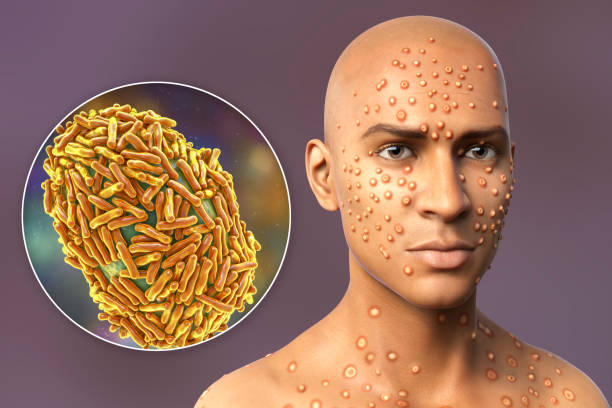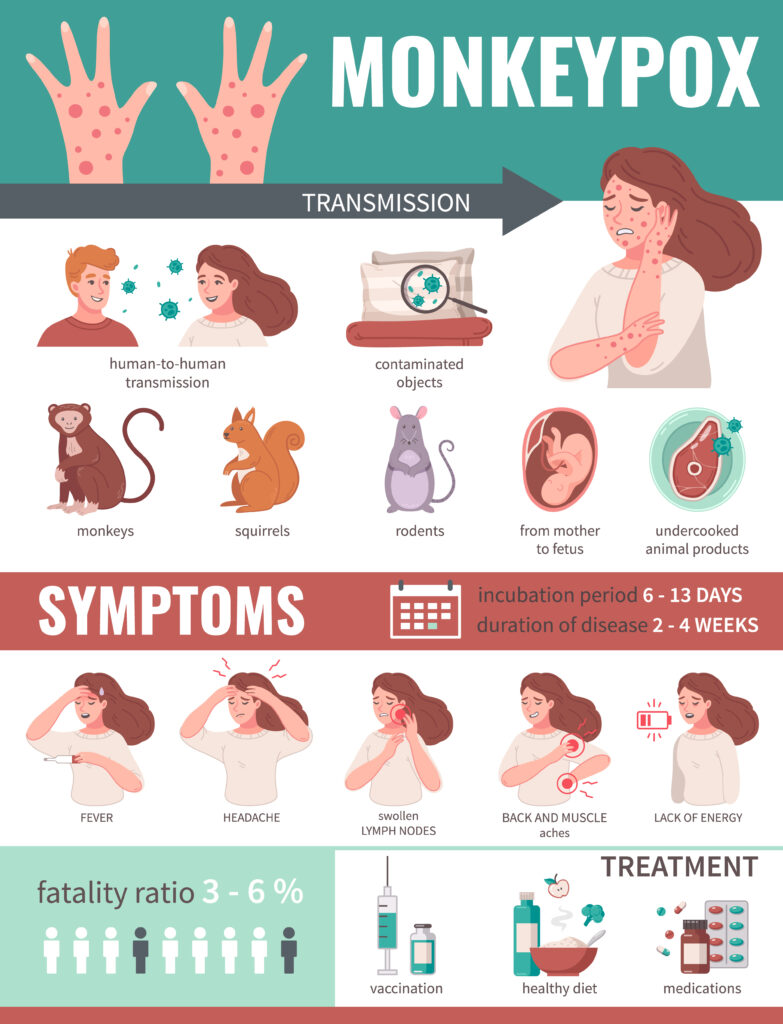
Monkeypox is a zoonotic virus from the Poxviridae family that causes monkeypox, a pox-like disease. This virus, which is found near rainforests in Central and West Africa causes disease in humans and monkeys, although its natural hosts are rodents. It is capable of human to human transmission. It is deadly in 10 percent of cases.
Mpox can be transmitted from animals to humans. The virus belongs to the Orthopoxvirus genus, which also includes the variola virus (responsible for smallpox). Mpox was first identified in 1958 in monkeys kept for research, hence the name. However, the primary reservoirs of the virus are rodents and other small mammals.
Transmission:-

Mpox spreads through close contact with an infected person or animal. Human-to-human transmission occurs via respiratory droplets, direct contact with bodily fluids, or lesions on the skin. It can also spread through contaminated materials such as bedding or clothing.
The virus does not spread easily between people without close contact, making it less contagious than diseases like COVID-19 or influenza.
Symptoms:-
The symptoms of mpox are similar to, but milder than, those of smallpox. They typically appear 7-14 days after exposure and include:-
- Fever
- Headache
- Muscle aches
- Backache
- Swollen lymph nodes
- Chills
- Exhaustion
- A rash that often begins on the face and then spreads to other parts of the body.The rash goes through several stages before forming a scab and eventually falling off. The illness usually lasts 2-4 weeks.
Recent Outbreaks:-
In recent years, there have been several notable outbreaks of mpox outside of Africa. The 2022 outbreak was particularly significant, with cases reported in multiple non-endemic countries simultaneously. This outbreak highlighted the need for rapid research and a coordinated global response.
Prevention and Treatment:-
Preventing mpox involves several strategies:
1. Vaccination:
The smallpox vaccine has been shown to be about 85% effective in preventing mpox. In response to recent outbreaks, vaccination campaigns have been initiated in affected areas.
2. Avoiding Contact:
Limiting contact with animals that could harbor the virus, such as rodents and primates, is crucial. In areas where mpox is endemic, people should avoid handling sick or dead animals.
3. Hygiene Practices:
Regular handwashing and using personal protective equipment (PPE) when caring for infected individuals can reduce the risk of transmission.
Treatment:-
There is no specific treatment for mpox, but antiviral drugs developed for smallpox may be beneficial. Supportive care, such as maintaining hydration and treating secondary infections, is essential for managing the disease.
Global Response:-
The global response to mpox has involved multiple stakeholders, including the World Health Organization (WHO), national health agencies, and local governments. Efforts have focused on surveillance, vaccination, public education, and research.
Surveillance:
Enhanced surveillance systems have been established to detect and monitor mpox cases. This includes tracking the spread of the virus and identifying potential outbreaks early.
Vaccination Campaigns: In response to the 2022 outbreak, several countries launched vaccination campaigns targeting high-risk populations. These efforts have been crucial in controlling the spread of the virus.
Public Education:
Public health agencies have launched awareness campaigns to educate people about the symptoms of mpox, how it spreads, and preventive measures. This has been vital in reducing stigma and encouraging people to seek medical attention if they suspect they have been exposed.
Research:
Ongoing research aims to better understand the virus, its transmission dynamics, and potential treatments. This includes studying the effectiveness of existing vaccines and developing new therapeutic options.
Conclusion:-
“Mpox is a serious health concern, but with the right information and precautions, we can protect ourselves and our communities.
For more information please visit-https://www.mayoclinic.org/diseases-conditions/infectious-diseases/expert-answers/monkeypox-faq/faq-20533608



